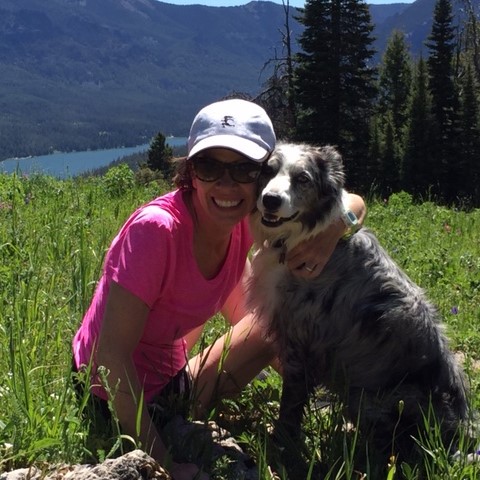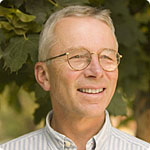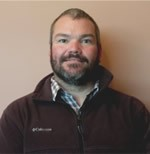People & Partnerships

Bill Dyer

Mary Stein

Bruce Maxwell

Pat Hatfield
Patrick Hatfield received a BS in range management from Montana State University (MSU) in 1983, an MS in range science from New Mexico State University in 1985, and a PhD in animal science from the University of Nebraska-Lincoln in 1988. Upon completion of his PhD, Patrick started his career as a research scientist at the U.S. Sheep Experiment Station. After eight years at the sheep station, Patrick moved to MSU where he continued his research along with teaching five classes and advising students. In addition to sheep nutrition and production research, Patrick’s research uses a team approach, incorporating expertise from agronomy, soil science, entomology, weed ecology, agricultural economics, and community development. All specialists focus on the profitable and environmentally sound incorporation of sheep into crop production systems. Since joining MSU in 1997, Patrick secured more than $7.5 million dollars in extramural competitive funding. Patrick’s publications include more than 70 peer reviewed journal articles. In addition to research and teaching, Patrick developed a free, online sheep ration program that has over 2000 active accounts in more than 60 countries. Patrick has served as major advisor or committee member on 25 graduate committees. Patrick served as Western Section American Society Animal Science (WSASAS) President in 2003 and was honored with the WSASAS distinguished service award in 2013. In 2013 Patrick was asked to serve as interim department head and in 2015 he became the permanent head of the Animal and Range Sciences Department. He and his wife, Nancy, have two children. Jillian is an animal science graduate from MSU and Sam recently finished service in the U.S. Marine Corps and is a student in business at MSU. For more information on Patrick's research and teaching program go to:

Mac Burgess

Carmen Byker Shanks
Assistant Professor, Foods and Nutrition; Sustainable Food Systems
I am an assistant professor of Food and Nutrition and Sustainable Food Systems. I am excited to work at a land-grant university, which supports synergism between a research, teaching, and outreach appointment. My goal is to inspire future food system and nutrition leaders through informed and current research in teaching; facilitate research to solve complex problems in communities related to nutrition and food systems; and provide service to strengthen the educational institution and local community via my teaching and research areas. I teach courses that explore community nutrition, culinary methods and management, and research methods. I rely on problem solving and reflection through current events and practical, hands-on experience to promote systems thinking with my students. My expertise lies in behavioral and social sciences focused on food, nutrition, and human development. As a whole my research investigates how socioecological factors in diverse food environments influence the evolution of nutrition behaviors across the lifespan in three applied areas: (1) school food environment, (2) consumer food environment, and (3) food assistance programs. I co-lead, with Dr. Selena Ahmed, the Food and Health Lab, which provides collaborative space and research facilities for studies addressing society’s most pressing issues of feeding communities with nutritious foods while maintaining the health of our environment. Improving community food security is a central tenant of all of my outreach efforts. For more information see: http://www.montana.edu/hhd/facultyandstaff/cbyker.html

Selena Ahmed
Assistant Professor, Sustainable Food Systems
My research, teaching, and outreach interests are at the intersection of the ecological, cultural, and health aspects of food systems with a focus on food security and food environments in health disparate communities. For the past 13 years, I have carried out transdisciplinary food systems research in a range of ecological and cultural contexts in China, India, Morocco, Venezuela, Belize, the Dominican Republic, and the United States. Since joining the faculty of Montana State University in Fall 2013, I jointly initiated The Food and Health Lab in collaboration with Dr. Carmen Byker Shanks with the objective to carry out and provide training on basic, behavioral, and applied research to explore agricultural-nutrition-health linkages. As the Principle Investigator of the Agroecology and Phytochemistry Group of the Food and Health Lab, I am particularly interested in identifying the socio-ecological determinants of environmental and human wellbeing in the food system. This work involves quantifying the influence of environmental factors and agricultural practices on ecosystem services, food quality, food access, and diets in the context of global change. The ultimate translational goal of this work is to develop evidence-based plans to promote biodiversity in agricultural systems and mitigate risk of food insecurity and diet-related chronic disease. To learn more about my collaborative projects, please visit our website at the MSU Food and Health Lab: www.montana.edu/foodandhealthlab/
Sustainable Food & Bioenergy Systems Partnerships
What follows is a growing list of SFBS partners at MSU, in the Bozeman community, in Montana, and beyond.
MSU
Montana Office of Rural Health
MT Agricultural Experiment Station (MAES)
Student Organizations
Friends of Local Foods (HHD, LRES & PSPP)Land Resources & Environmental Science Club (LRES)
Montana Student Dietetic Association (HHD)
Students for a Sustainable Future (Engineering)
Sustainability Now (SNOW)
Bozeman
Bozeman Cultural CouncilChefs Collaborative
Community Food Co-op, Bozeman
Gallatin Valley Farm to School
Montana Outdoor Science School
Northern Rockies Bioneers
Rural Landscape Institute (formerly Cook Center for Sustainable Agriculture in the American West)
Montana
Alternative Energy Resources Organization (AERO)Grow Montana
Mission Mountain Food Enterprise Center
Montana Food and Agriculture Development Center Network
National Center for Appropriate Technology
National Sustainable Agriculture Information Service (ATTRA)
Sustainable Agriculture Research and Education (Western SARE)
